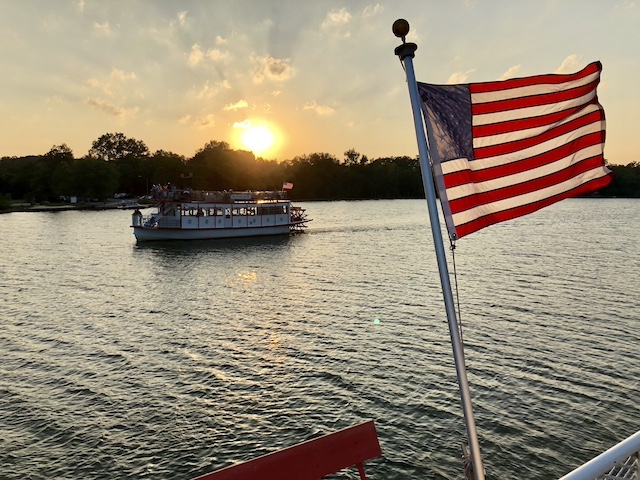July 4th is a celebration of American independence from a monarchy and transition to a democratic system of governance. The words “We the People” give us the responsibility of not only choosing our leaders but also voicing our opinions and ideas.
Friends of the Fox River works to be a voice for the Fox River Watershed. Being the voice of a 200-mile-long jurisdiction that spans two states, 15 counties and over 100 municipalities requires a team of voices.
The Fox
In the 1960’s, the voice of the Fox River came from our local legend, The Fox. The Fox created media attention by his acts of defiance against industrial polluters. His intent was not just to punish the violators of the watershed’s waters, air and inhabitants. His actions included insuring media coverage as the messenger to the general public. The plan was to empower “We the People” to demand that our elected representatives take corrective action. Some folks even credit The Fox with influencing the adoption of the federal Clean Water Act. The Fox was an activist, a publicist, and an agent of change. For more on the antics on The Fox, read his autobiography, “Raising Kane.”

Friends of the Fox River
In the late 80s, angler Pat Reese was distraught over construction debris dumped over a spawning bed in the river. He approached the Elgin City Council and learned that the Fox River needed representation. He formed the Friends of the Fox River (FOTFR) to be that advocacy voice. 30+ years later, we continue as an advocate, but times and threats have changed.
Instead of plugging up pipes and leaving anonymous messages for journalists like The Fox, we proactively educate our youth, the general public, and represent the Fox River in public forums, print and council chambers when appropriate. The watershed is a big place and we rely upon individuals, organizations, agencies, and others to be our partners to represent the well-being of our watershed.
Current Climate
In the era of The Fox, the major threat was direct pollution from municipal and industrial waste. Since the Clean Water Act in 1972, those threats have been significantly reduced through a permitting system. The 1980’s began an era of urbanization in our watershed. Together with agricultural influence in rural portions of the watershed, this has been the area of most concern. Most recently, development is taking the form of large logistical facilities, especially near major transportation corridors. The conversion of open or agricultural land to impervious surfaces (roof tops and pavement) has a significant impact upon local water quantity (surface and groundwater) and quality.
Blackberry Creek
In 1996, flooding and associated damage prompted the formation of the Blackberry Creek Watershed Resource Planning Committee. This committee, with the assistance of numerous municipal, county, regional, state, and federal agencies, as well as private consultants, developed the Blackberry Creek Alternative Futures Plan. This plan was completed in 1999 and adopted by Kane & Kendall counties and most of the municipalities (Aurora, Batavia and Yorkville, and the Villages of Campton Hills, Elburn, Montgomery, North Aurora, Oswego and Sugar Grove) within its boundaries.
The purpose of this project was to identify alternative visions for the future of the watershed and to evaluate their implications. Armed with this information, the municipalities and counties can make informed decisions related to site-design practices and future land uses. In 2010, over 90 stakeholders representing Blackberry Creek’s residents, municipal governments, organizations, businesses, Kane and Kendall counties, and other agencies convened to develop the Blackberry Creek Watershed Plan. The plan focuses on specific land use actions that can be taken by local units of government to protect the watershed’s water quality.
Sugar Grove
Currently proposed at the I88/Route 47 interchange is a 3.5 million square foot community of warehouses. A local group, Thoughtful Progress has formed to oppose this project based upon the economic and environmental impacts on their community. At a public hearing Sugar Grove trustees heard from the community. FOTFR was there to represent Blackberry Creek. The officials that are elected for 4-year terms will be making decisions that will have financial and environmental long-term impacts. That is a huge responsibility. It is hoped that they will use community voices and the decades of work on the Blackberry Creek Watershed Plan to guide them.
Democracy is our Door
NOW is the time to address the issues inherent in adding another logistics facility to our watershed. We will not be able to prevent private enterprises from acquiring land, but we can remind our elected leaders that the watershed is worth protecting, that our water quality and quantity will be affected by decisions made by private enterprises. We the People should elect and support our representatives who choose watershed health over short term promises. Stay informed and be a voice for the Fox River Watershed. Together, we (We the People) keep on fixin’ the Fox.






